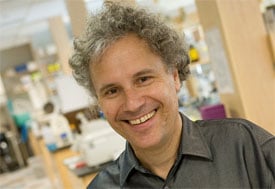 Victor R. Ambros, PhD, the Silverman Chair in Natural Sciences, professor in the Program in Molecular Medicine and co-director of the RNA Therapeutics Institute, has been awarded the 2014 Wolf Prize in Medicine for his discovery of the microRNA (miRNA) molecules that play a key role in controlling gene expression in natural processes and disease development.
Victor R. Ambros, PhD, the Silverman Chair in Natural Sciences, professor in the Program in Molecular Medicine and co-director of the RNA Therapeutics Institute, has been awarded the 2014 Wolf Prize in Medicine for his discovery of the microRNA (miRNA) molecules that play a key role in controlling gene expression in natural processes and disease development.
Dr. Ambros shares the prize with Gary Ruvkun, PhD, of Massachusetts General Hospital and Harvard Medical School for their contributions to uncovering the role of microRNAs in the regulation of gene expression. Nahum Sonenberg, PhD, of McGill University in Canada also shares the prize for his discovery of the proteins that control the protein expression mechanism and how they operate.
“The reverberations from Dr. Ambros’ breakthrough discovery of miRNA continue to be felt throughout every corner of the biomedical research world,” said Terence R. Flotte, MD, the Celia and Isaac Haidak Professor of Medical Education, executive deputy chancellor, provost, dean of the School of Medicine and professor of pediatrics. “This very prestigious Wolf Prize is another fitting recognition of that profound effect.”
Ambros discovered microRNAs (miRNAs) in 1993, while studying the molecular genetics of C. elegans. His group cloned the lin-4 gene, which affects the timing of developmental events by regulating a protein called lin-14. But in a surprise, lin-4’s gene product turned out not to be a protein at all, but instead a small (22-nucleotide) RNA. In work published simultaneously, the Ruvkun laboratory showed that lin-4 regulates lin-14 translation via a direct RNA-RNA interaction.
Thousands of miRNAs have since been found, including in humans, and miRNAs are shown to be linked to many diseases, including cancer and neurological diseases. The application of miRNAs to target disease genes and the technology to block action of miRNAs are emerging as new therapeutic approaches.
The Wolf Prizes are awarded by the Wolf Foundation, which was founded in 1975 by Ricardo Wolf, a German-born inventor and Cuban diplomat. The foundation honors outstanding scientists and artists “for achievements in the interest of mankind and friendly relations among peoples” and awards scholarships to undergraduate and graduate students, and grants to scientists engaged in research at Israeli institutions of higher education.
Since 1978, the Wolf Foundation has awarded science prizes annually in the categories of agriculture, chemistry, mathematics, medicine and physics. In the arts, one prize rotates annually among architecture, music, painting and sculpture. The prize in each field includes an award of $100,000, which is shared among co-recipients in any given category. A total of 253 scientists and artists from 23 countries have been honored with Wolf Prizes.
Ambros and his research collaborators have received numerous honors for their scientific achievements, including the Lasker Award for Basic Medical Research, the Gairdner International Award, the Newcomb Cleveland Prize from the American Association for the Advancement of Science, the Genetics Society of America Medal, the Janssen Award for Biomedical Research and the Keio Medical Science Prize. He was elected to the National Academy of Sciences in 2007 and to the American Academy of Arts and Sciences in 2011.
The 2014 Wolf Prizes will be presented in May by the President of the State of Israel at a ceremony at the Knesset Building (Israel´s Parliament) in Jerusalem.
Related links on UMassMedNow
Victor Ambros wins Keio Medical Science Prize
Ambros receives Janssen Award for Biomedical Research
Victor Ambros named to the American Academy of Arts & Sciences